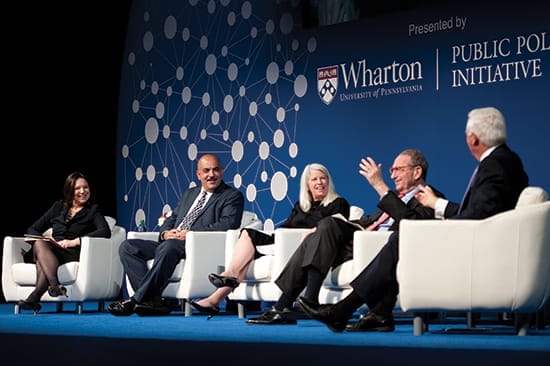Economics is known to some as the “dismal science,” but Austan Goolsbee was illuminating and entertaining at the Wharton Economic Summit.
The University of Chicago Booth School economics professor quoted his grandmother to explain why the path out of economic uncertainty for the U.S. is to be found within, and not from help elsewhere. Eighty percent of the world doesn’t care about your problems, Goolsbee’s grandmother used to tell him, and the other 20 percent are glad.
So how is that search going for solutions from a domestic source? Goolsbee said that leaders in Washington, D.C., are doing the opposite of nothing; they are making matters worse. (Goolsbee has insider knowledge, and perhaps bias, as former chairman of the Council of Economic Advisers and cabinet member for President Barack Obama.)
“Each player in Washington is just trying to get the clog out of their side of the drain,” he told the audience of eminent business leaders at Jazz at Lincoln Center in New York City on March 7.
At the time of the Wharton Economic Summit, sequestration had just gone into effect, and Goolsbee was quick to note that despite their partisan antics, Washington politicians had managed to do half of what Simpson-Bowles (a grand deficit-cutting bargain that never got put into effect) asked for—they had cut $2 trillion from the deficit, whereas Simpson-Bowles called for $4.5 trillion.
“We’re going to do it in the most painful … irritating way we could do it,” Goolsbee said about deficit reduction. “We’re doing it by the path of least resistance.”
Despite the weight of the topic and the gravitas of the Summit, Goolsbee averaged a laugh a minute with his colorful stories and cutting wit. And ultimately, he left the audience on a high note. He lauded the Federal Reserve’s policies, forecasted a strong U.S. recovery in the mid- to long-term and praised the American entrepreneurial culture.
His hardly “dismal” performance served as the keynote during lunch, just one part of the Wharton Economic Summit’s day of engaging programming.
The Summit began with an interview between GE Chairman and CEO Jeff Immelt and Michael Useem, the William and Jacalyn Egan Professor of Management. Immelt’s pronouncements on health care and the economy drew attention reminiscent of a Fed chairman testifying before Congress.
Four panels took place during the day, each on a pressing topic—innovation, health care, real estate and energy—and each featured A-list lineups. Panelists included such business luminaries as Johnson & Johnson Chairman and CEO Alex Gorsky, WG’96; Marathon Oil Chief Financial Officer Janet Clark, WG’82; Jon Gray, C’92, W’92, global head of real estate at Blackstone; Jeff Blau, WG’92, CEO of Related Cos.; Lady Barbara Judge, CW’66, chairman of the U.K. Pension Protection Fund; and Gary Gottlieb, WG’85, president and CEO of Partners HealthCare. The Wharton Economic Summit convened many other experts from across the spectrum of business and economic policy to discuss some of the most critical issues faced by business leaders today.
—By Matthew Brodsky


























